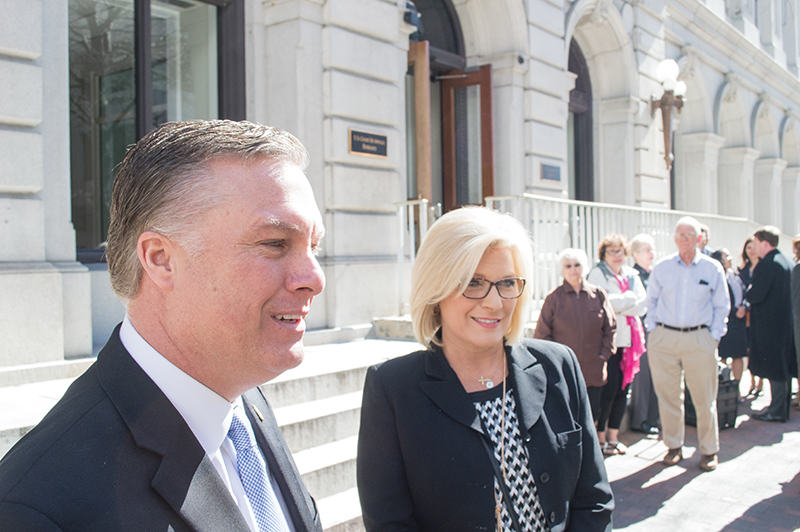Editorial: Was prayer lawsuit worth the price?
Published 11:00 pm Saturday, January 5, 2019

- Salisbury Post File Photo - County Commissioners Chairman Greg Edds, at left, speaks to reporters in 2017 following oral arguments in the 4th Circuit Court of Appeals.
With a final ruling rendered and a bill coming due in Rowan County’s prayer lawsuit, taxpayers and voters must now consider whether the result is worth the price commissioners will pay.
On Friday, we published a story in which commissioners discussed one of the last steps in the suit — paying attorney’s fees to the North Carolina ACLU (“Prayer suit costs to be considered by county”). County Attorney Jay Dees said that based on the length of the case, a request for fees could be as high as $500,000. Following publishing, the ACLU clarified that the court already ordered payment of $285,000 in fees for the suit — originally filed in federal district court. Options for appeal ran out last year when the U.S. Supreme Court turned down a request to hear the case. That leaves an unfavorable, 10-5 ruling by all 15 judges on the 4th Circuit Court of Appeals as the final verdict.
A bit of cold comfort for those disenchanted with the commissioners’ decision to pursue the suit is that Rowan County was represented in court for free by the National Center for Life and Liberty. So the ACLU fees will be the only significant costs. Still, we wonder whether county commissioners — from Carl Ford to the current bunch — would have made the same calls if they knew the final price tag would be $285,000 — a figure that would be a welcome addition to any county department’s budget. And are we better off for the publicity our community received as a result of a suit over commissioners’ ability to pray as they please at the start of their meetings?
Because, to be clear, judges did not rule against Christian prayer generally nor its ability to be spoken at the start of meetings — a fact that seemed to get lost at times. The case was narrowly tailored to whether commissioners, themselves, could pray and whether prayers from 2007 to 2013 crossed a line into proselytizing, among other things.
As 4th Circuit Judge J. Harvie Wilkinson wrote in the 2017 ruling against Rowan County, “free religious exercise can only remain free if not influenced and directed by the hand of the state. On this score, the county simply went too far.”
What’s more, even if our county commissioners are proud of their stand, do the principles they embraced, no matter how noble, outweigh the costs? According to Chairman Greg Edds, the county’s coffers will bear the burden of the prayer suit and not a generous third party — something commissioners had previously hoped.
We were particularly perplexed by a statement by Commissioner Judy Klusman in the story about Monday’s meeting.
“The thing that really disturbs me is that no matter what the county would have done, we’d be paying the ACLU money,” Klusman said. “I just hate that it’s going to be taxpayer money going to pay for this. I’d much rather have that money going into schools.”
Surely commissioners considered a loss was possible and that taxpayer money could be required to pay the bill. If not, that seems to be a significant oversight for a matter that received unanimous support more than once.
On Monday, as commissioners discuss the fees they must now pay, we’ll likely hear talk about how the prayer issue is not yet dead. A similar case in the 6th Circuit was also not taken up by the U.S. Supreme Court. In that case, however, judges said the prayer practices of a group of county commissioners in Michigan were constitutional. But that’s a different jurisdiction — we’re in the 4th Circuit — and the ruling does not apply to Rowan. Importantly, Wilkinson wrote that Rowan County’s case did not represent a global verdict about all legislator-led prayer.
It was “a specific practice in one specific setting with one specific history and one specific confluence of circumstances,” he wrote.
Sometimes standing up for what you believe in comes at a price. Among the questions commissioners must answer as the case comes to a close: Is the price taxpayers must now fork over a good value proposition compared to the other possible uses for $285,000?


